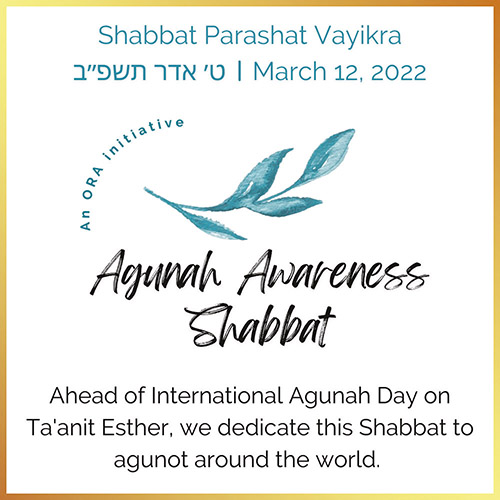
The phones at ORA are always ringing.
In the 10-plus years since I’ve started advocating for agunot, the need for get-refusal work has never slowed or stopped, only increased. There was a brief—and eerie—few weeks when the initial shock of the COVID-19 lockdown made it difficult for people to safely leave marriages, but our call volume in the years since has more than made up for it, tripling since pre-Covid numbers.
But what is get refusal about, at core? Is this a halachic problem? A legal issue? A systemic failure? A community embarrassment? All of the above?
There are many faces to the agunah crisis, and multiple terms we could use to discuss the get issue. But the phrase I want to talk about today is spiritual abuse.
Spiritual abuse is the use of religion to control another person—and while it was first studied in the context of abusive faith leaders, it is increasingly discussed in the context of domestic abuse. But let’s back up for a minute. Domestic abuse, contrary to popular opinion, does not only refer to violence or threats of physical harm. Abuse involves a larger effort to dominate a partner, and that campaign employs multiple tactics and strategies. Imagine a toolbox with all the usual suspects—wrench, hammer, etc. You might use different tools for different things, but they are all in the service of one goal, in my case usually building an IKEA chair.
Similarly, abusers have various “tools” that they adopt in order to gain and maintain control over their partners. Some tools, like physical violence, are pretty obvious—“If you don’t do what I say, I’ll beat you up” is a pretty straightforward way to control someone’s behavior. But most of the tools in the domestic violence toolbox are much more complex and insidious. For instance, money, intimacy, and even emotions are all tools that abusers use to intimidate and control their partners. (And for those of you thinking that “emotional abuse is just some hurt feelings,” trust me when I say that this kind of abuse can be especially destructive.)
In frum communities, there’s a particularly potent tool abusers use to obtain control—religion itself. This can take on many forms, from interfering with a spouse’s religious practice to demeaning his or her relationship with Hashem (“What, you think He wants your tefillot?”) to taking advantage of halachot in order to further abuse. Here are a few examples: Pushing a spouse to cross the boundaries of Shabbat or taharat hamishpacha, telling a partner her spirituality is worthless, using concepts like shalom bayis to force someone to stay in a toxic relationship. I will never forget my conversation with a woman who was suffering severe physical abuse. After years of being victimized, she realized that her spouse was much more likely to hurt her on Shabbat, because while she would eventually call the police, she would wait much longer to do so, leaving the situation time to escalate and become more dangerous.
Spiritual abuse is particularly powerful because it interferes with the victim’s basic sense of self and value. For instance, say a husband forces his wife to engage in intimacy during niddah. In a typical case, this behavior would be accompanied by messages like, “If you dressed appropriately, I wouldn’t have to do this. See what you made me do?” This, in turn, builds a deep sense of shame in the victim. She now feels she has committed a sin, and is now distanced from God. In our world, where Torah and our relationship with Hashem are how we make meaning out of our lives, co-opting these very elements into a pattern of abuse makes the abuse particularly devastating.
When a person withholds a Jewish divorce, it is generally part of a larger picture. ORA’s statistics indicate that the vast majority of agunah cases involve a prior history of domestic violence, typically in numerous forms. Not only is the get just one of the tools a Jewish abuser can keep in his toolbox, it’s an especially valuable one because even when every other thread connecting these two people has been cut, when they no longer share legal marital status or finances or young children, the get remains, tying them together. When an abuser has run out of options, the get can be the final means of maintaining control. This is a manipulation of the halachic process into a form of abuse, which is the very essence of spiritual abuse. And that’s why get refusal hits victims so hard, causing symptoms similar to post-traumatic stress disorder, including anxiety, depression and disconnection.
But why focus on terms like “spiritual abuse”? Why do they matter? Because spiritual problems, like get refusal, require spiritual solutions. When an agunah is struggling for a get, she (or he, in the case of an agun), does not only need legal, financial or psychological support—she needs the spiritual support of her community, standing with her and for her.
At ORA, we’ve seen firsthand the difference it makes when communities take a stand against get refusal. In cases where communities exhibit strong leadership, agunot are supported and empowered, and get refusers give up the fight faster. That’s why we’ve made this Shabbat an annual Agunah Awareness Shabbat. This Shabbat comes right before International Agunah Day, Ta’anit Esther, where communities around the world talk about how to bring an end to get refusal.
Get refusal has never been the most comfortable topic for us to discuss in our shuls and communities, but that’s the reason this conversation is necessary. We created Agunah Awareness Shabbat so that every agunah can walk into shul Shabbat morning knowing her community cares about this issue—and about her. So that we can stand together against the perversion of Torah and halacha that is get refusal.So that we can, finally, create a Jewish community of true spirituality and holiness, inside and out.
Keshet Starr, Esq. is the CEO of the Organization for the Resolution of Agunot (ORA).









